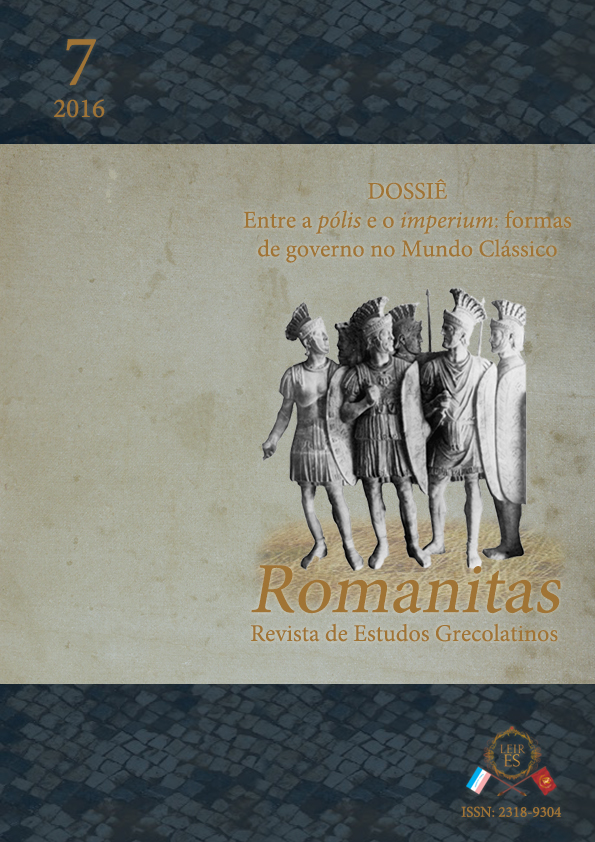The Roman Principate and the political corruption: the 'repetundae' trials in the Epistles of Pliny the Younger
DOI:
https://doi.org/10.17648/rom.v0i7.14521Keywords:
Principate, Political corruption, Senatorial court, Pliny the YoungerAbstract
The disadvantages of a bad government and the fight against corrupt practices have been debated since antiquity. In Rome, especially after the Second Punic War (218-201 B.C.), several measures were employed to contain the spread of the practices that were considered corrupt. One of them was to create laws to prevent and punish the poor provincial administration and the extortion committed by Roman magistrates, such as Lex Iulia repetundarum (59 BC). During the Principate, the search for ways to combat corruption continued. Therefore, this article aims to interpret the reports contained in the Epistles of Pliny the Younger concerning five repetundae trials against former governors of Roman provinces before senatorial court. Our study aims to understand the strategies employed in Rome to combat political corruption and the role of the Senate, as a court of justice, in the maintenance of the Empire administration.
Downloads
References
Documentação textual
ARISTÓTELES. Política. Introducción, traducción y notas de Manuela García Valdés. Madrid: Editorial Gredos, 1988.
ARISTOTLE. Politics. Translation by M.A.H. Rackhan. Cambridge: Harvard University Press, 1959.
PLINIO EL JOVEN. Panegírico a Trajano. Introducción, edición, traducción y notas de Rosario Maria Soldevila. Madrid: Consejo superior de investigaciones científicas, 2010.
PLINIO EL JOVEN. Cartas. Introducción, traducción y notas de Julián González Fernández. Madrid: Editorial Gredos, 2005.
PLINY. Letters and panegyricus. Translated by Betty Radice. Cambridge: Harvard University Press, 1969-1969. 2 v.
Obras de apoio
BERGER, A. Encyclopedic Dictionary of Roman Law. Transactions of the American Philosophical Society, v. 43, n. 2, 1953.
BIASON, R. C. (Org.). Temas de corrupção política. São Paulo: Balão Editorial, 2012.
BUCHAN, B. An Intellectual History of Political Corruption. New York: Palgrave Macmillan, 2014.
CASTRO-CAMERO, R. El crimen maiestatis a la luz del senatus consultum de Cn. Pisone Patre. Sevilla: Secretariado de publicaciones de la Universidad de Sevilla, 2000.
GARNSEY, P. Social status and legal privilege in the Roman Empire. Oxford: Oxford University Press, 1970.
GIBSON, R.; MORELLO, R. Readings the letters of Pliny the Younger: an introduction. Cambridge: Cambridge University Press, 2012.
HARDY, E. G. Six Roman laws. Oxford: Clarendon Press, 1911.
HARRIES, J. Law and crime in the Roman World. Cambridge: Cambridge University Press, 2007.
LÓPEZ, C. R. La corruption a la fin de la Republique Romaine (IIe– Ier s. av. J-C.): aspects politiques et financiers. 2005. 381f. Tese (Doutorado em Letras) – Faculté de Lettres et Sciences Humaines, Université de Neuchâtel, Neuchâtel, 2005.
MINERS, N. J. The Lex Sempronia ne quis iudicio circumveniatur. Classical Quartely, v. 8, n. 3-4, p. 241-243, 1958.
MOUSOURAKIS, G. A legal history of Rome. New York, Routledge, 2007.
RADICE, B. Preface and introduction. In.: PLINY. Letters and panegyricus. Translated by Betty Radice. London: Harvard University Press, 1969-1969. 2 v.
ROBINSON, O. F. Penal practice and penal policy in ancient Rome. London: Routledge, 2007.
SHERWIN-WHITE, A. N. The letters of Pliny: a historical and social commentary. Oxford: Oxford University Press, 1966.
TALBERT, R. J. A. The senate of Imperial Rome. Princeton: Princeton University Press, 1984.
Downloads
Published
Issue
Section
License
Copyright (c) 2016 Romanitas - Revista de Estudos Grecolatinos

This work is licensed under a Creative Commons Attribution-NonCommercial-NoDerivatives 4.0 International License.
a. The authors retain copyright and grant the journal the right to first publication.
b. The authors are authorized to assume additional contracts separately, for non-exclusive distribution of the version of the work published in this journal (e.g., publishing in institutional repository or as a book chapter), with acknowledgment of authorship and initial publication in this journal.
c. Authors are allowed and encouraged to publish and distribute their work online (e.g. in institutional repositories or on their personal page) after the first publication by the journal, with due credit.
d. The journal's texts are licensed under a CC BY 4.0 Deed Attribution 4.0 International Licence (CC BY).




























